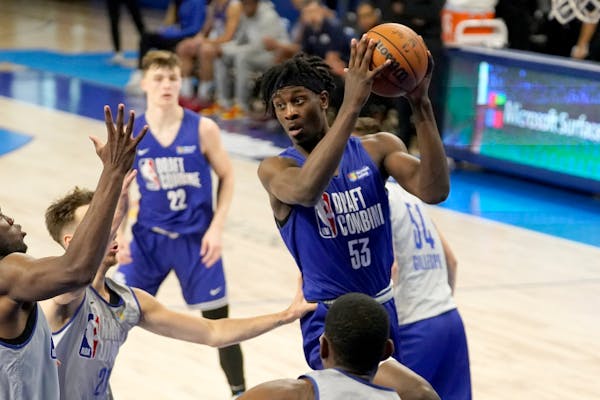The Timberwolves didn't just sit on their hands and wait to draft with the 53rd pick on Thursday night.
After trying for a while to move into a slot earlier in the draft, the Wolves, who didn't have a first-round pick as a result of the Rudy Gobert trade last year, executed a trade for the 33rd pick from the Spurs and selected Leonard Miller from the G League Ignite with that pick.
In the deal, the Wolves sent the Spurs two future second-round picks – a 2026 second-rounder they acquired from Utah in the D'Angelo Russell three-team trade and their own 2028 second-round pick.
With the 53rd pick, the Wolves selected guard Jaylen Clark out of UCLA. Clark played three seasons and averaged 13 points and six rebounds last season before an Achilles injury ended his season in March.
Miller is a 19-year-old, 6-10 210-pound forward from Toronto whose body type, rebounding and defensive ability were attractive to the Wolves. He averaged 18 points and 11 rebounds last season for Ignite, which allows young NBA prospects to play against G League competition instead of players attending college for one season. He shot 33% from three-point range and 55% from the field. Miller was teammates with guard Scoot Henderson, who went third overall to Portland.
His shot will need work, but the Wolves like his combination of size and athleticism, especially on the defensive end. Team president Tim Connelly could not speak directly about Miller because the trade was not official at the time he addressed the media early Friday morning, but he spoke in generalities about how evaluating players that young in the G League could help them develop in the NBA.
"The G League is probably a top six league in the world," Connelly said. "We think those numbers translate. If said prospect was an elite rebounder, they generally translate. Rebounding is one of the skills that pretty consistently shows up. If we were lucky enough to get a player like that, it'd be pretty intriguing."
Connelly could comment publicly on Clark, who is known for his defensive ability and was considered one of the best perimeter defenders in college basketball last season.
"We had him as a high first-round grade all year," Connelly said. "Unfortunately he had the injury. We think there's no better wing defender in the draft. He brings an aggression and toughness and intelligence that allows guys like that to make it. We're super excited to add him. He's not physically there. We're going to be very patient with him. Prior to the injury we thought the guy was an easy first-round pick."
There was no definitive timetable for when Clark might be ready to resume basketball activities. Clark's lateral quickness helps him guard multiple positions, and he averaged 2.6 steals per game. He was the Pac-12 Defensive Player of the Year.
"You don't have to watch much video to see the way that guy locks people down defensively," Connelly said. "He's got great positional size, excellent rebounder. We think he's an emerging shooter. Super smart, super tough and just an unbelievably competitive guy."
Connelly also said he admired that Clark stuck with the program and still developed as a player despite not getting the minutes he might have sought in his first two seasons.
"We kind of like these guys who are self-made," Connelly said.
On Wednesday, Connelly said no deal was close for the Wolves to move into earlier regions of the draft, but he did predict picks in the last first round and early second round might be up for grabs.
The Wolves made their move early, committing to the trade late in the first round, and hoped one of their targets was still there.
With the Wolves up against the luxury tax this season and potentially over it for the foreseeable future, they will need young talent on relatively cheap contracts to contribute. Landing players in the second-round allows the Wolves to set more cost control for that prospect's contract than drafting him late in the first, where salaries are slotted.
"We're out a bunch of first round picks, so we're probably a bit more aggressive trying to find guys that are maybe a year early, or guys that have slipped for an injury, for example, like Jaylen," Connelly said. "I don't think we can just follow too many trends. I think we've got to be creative and kind of cross our fingers."
The Wolves didn't have a first-round pick for the second time in three seasons and won't have one in 2025, 2027 and potentially 2029. Last season, they had two and selected Duke guard Wendell Moore Jr. and Auburn center Walker Kessler, who went to Utah as a part of the Gobert trade and then finished third in this season's Rookie of the Year voting.
The Wolves handed the 16th pick over to Utah this season, and with that pick the Jazz selected Baylor guard Keyonte George.

Kostecka: From a West Coast kid, Gophers-Hawkeyes rivalry is one of the best

Twins-Red Sox rained out, will play split doubleheader Sunday

Wild goalie Jesper Wallstedt ready for more NHL action, but his chances could be limited

